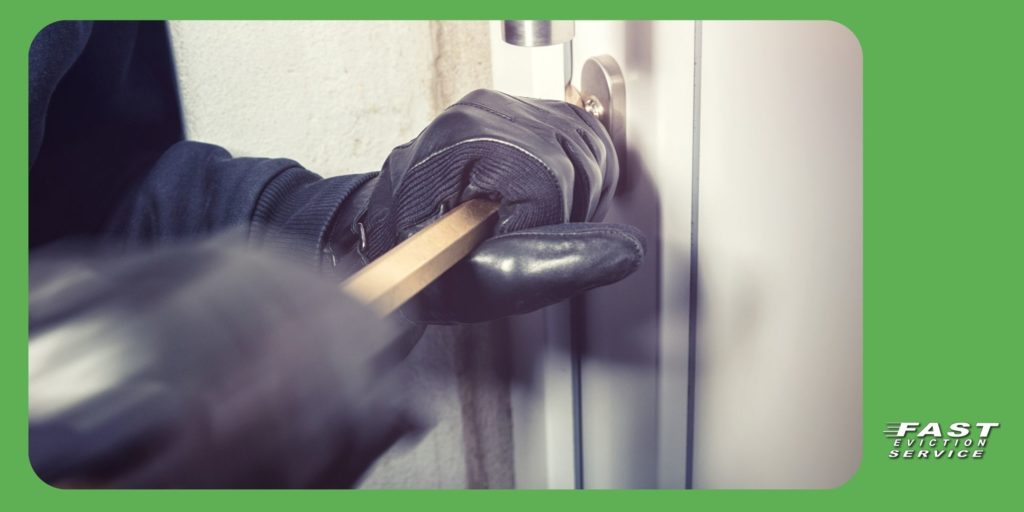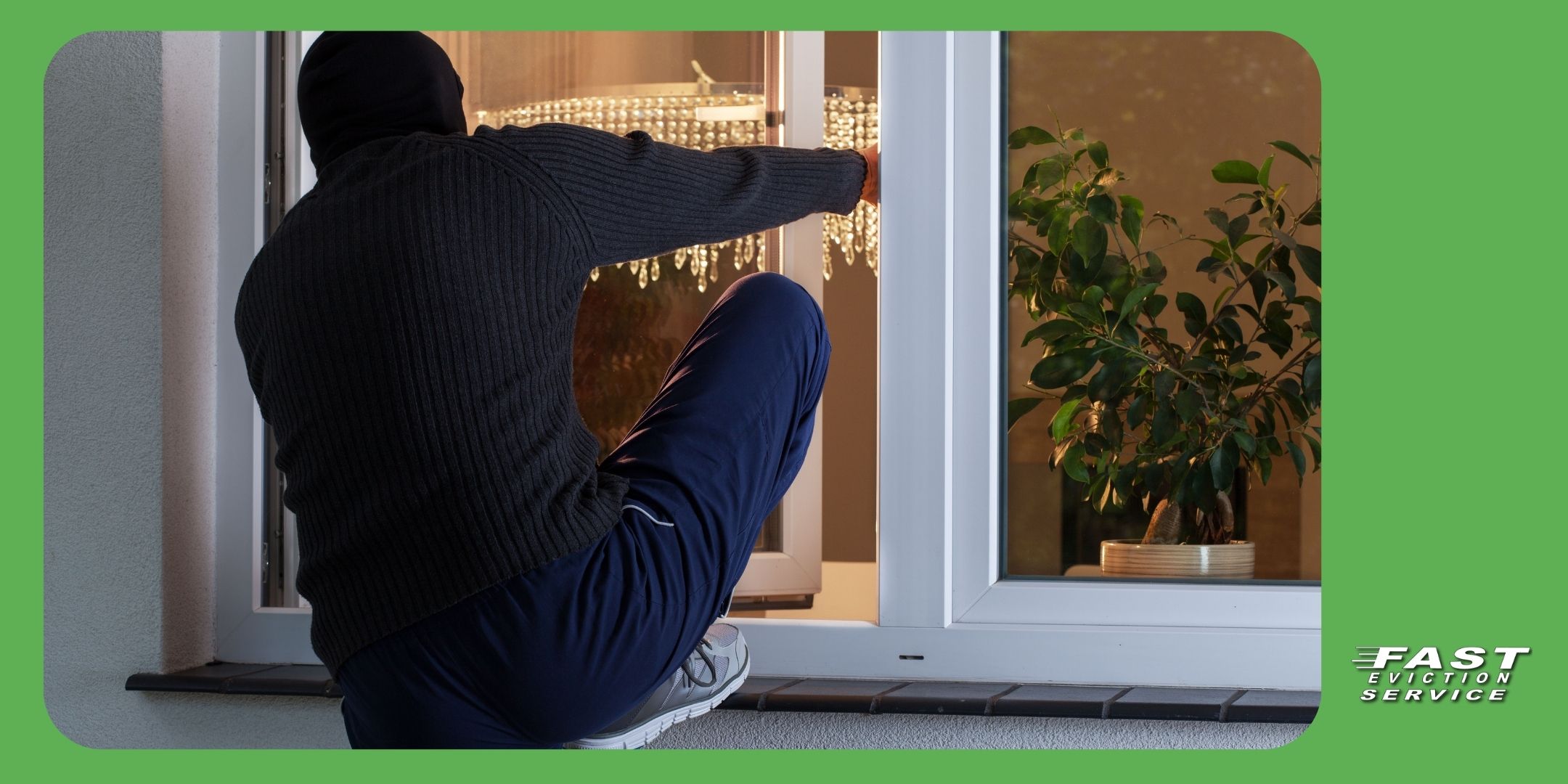Updated 04/03/25
Experiencing a burglary in a rental property is one of the most stressful events a tenant or landlord can face. Beyond the emotional distress, a break-in sparks urgent questions about responsibility: Who pays for repairs? Is the tenant allowed to break their lease? What legal obligations do landlords have when it comes to rental property security?

These questions become even more important when you realize how frequently these incidents occur. According to the FBI, property crimes make up a significant portion of all reported crimes in the United States. And in rental units, the issue of who is responsible after a break-in isn’t always as clear-cut as you might think. Whether you’re a landlord or tenant, understanding your rights and duties can help you respond effectively and prevent disputes.
Table of Contents
- What to Do Immediately After a Rental Property Burglary
- Tenant Rights and Lease Termination Options After a Break-In
- Landlord Responsibilities After a Break-In: What the Law Requires
- Who Pays for Damages After a Rental Property Burglary?
- Understanding Insurance Coverage for Burglary in Rentals
- Common Lease Clauses That Apply After a Burglary
- How Tenant Behavior Can Impact Liability After a Break-In
- Tips to Improve Security and Prevent Future Break-Ins
- How Communication Between Landlord and Tenant Can Prevent Legal Issues
- Legal Recourse for Negligence in Rental Property Security
- Frequently Asked Questions About Burglary in Rental Property
What to Do Immediately After a Rental Property Burglary
The first step after discovering a break-in in a rental property is always to contact local law enforcement. A police report serves as official documentation and will be needed for insurance claims, lease discussions, and any legal action. Both tenants and landlords should also document the damage with photographs and written notes.
For tenants, it’s crucial to notify the landlord as soon as possible. Even if only personal belongings were stolen, the landlord must be made aware of property damage like broken locks or doors. In many cases, landlords will need to arrange for immediate repairs, especially if the property is no longer secure.
Changing locks promptly, boarding up broken windows, and improving lighting are not just for safety—they also show good faith on the landlord’s part. Quick action can de-escalate the situation and foster trust between parties, something that’s crucial as emotions run high after a burglary in a rental property.
Tenant Rights and Lease Termination Options After a Break-In
When a burglary occurs, tenants often wonder: “Can I break my lease after a burglary?” The answer depends on state laws and the lease agreement. Some states allow tenants to break a lease without penalty if the rental unit becomes unsafe or uninhabitable. However, proving uninhabitability due to a single break-in can be tricky unless the incident is part of a pattern of ongoing crime or neglect.
In general, tenants have a right to live in a safe and secure environment. If a landlord fails to repair locks, replace broken windows, or address repeated break-ins, the tenant may have legal grounds to terminate the lease early. Tenants should document all communication and give the landlord reasonable time to address security concerns.
It’s also worth checking the lease for any “early termination due to crime” clauses. These are more common in modern lease agreements, especially in urban areas with higher crime rates.
Landlord Responsibilities After a Break-In: What the Law Requires
Landlord responsibilities after a break-in revolve around maintaining a habitable and secure property. Most states require landlords to provide working locks, proper lighting in common areas, and functioning windows and doors. If the break-in revealed a failure to meet these standards, the landlord could be held liable.
However, landlords are not usually responsible for stolen tenant property unless gross negligence can be proven. For example, if a landlord ignored repeated complaints about broken locks, they might face liability. On the other hand, if the rental unit met all basic security standards and the break-in was random, legal responsibility usually falls more on the criminal than the property owner.
Timely repairs are a major part of the landlord’s duty. Delaying repairs not only puts tenants at risk but can lead to lawsuits and strained relationships. Most importantly, a landlord should always document every repair and communication in writing.
Who Pays for Damages After a Rental Property Burglary?
Here’s where things often get complicated. Tenants typically cover the cost of stolen personal property unless they have renters insurance. Landlords cover structural damages, such as broken doors, smashed windows, or damaged locks. This division of financial responsibility is usually outlined in the lease agreement.
That said, there are gray areas. Suppose the tenant was away for an extended period and left a window open. In that case, the landlord might argue tenant negligence. Conversely, if a landlord failed to fix a broken lock after being notified, they might be required to cover more than just structural damage.
A shared understanding and clear documentation are vital in these situations. When both parties know their responsibilities and communicate openly, issues are often resolved without legal involvement.
Understanding Insurance Coverage for Burglary in Rentals
Both landlords and tenants should carry insurance to protect against burglary losses. A tenant insurance stolen items policy (commonly called renters insurance) can cover valuables, electronics, and furniture. Meanwhile, landlord insurance generally covers the structure itself, including repairs after break-in rental damage.
Insurance claims usually require a police report and proof of ownership. Tenants should photograph belongings in advance and maintain receipts whenever possible. Landlords should confirm that their policy includes coverage for vandalism and break-ins—some basic plans do not.
It’s also good practice for landlords to inform new tenants about the value of renters insurance. While it isn’t legally required, it’s a smart move that can prevent a lot of financial hardship and finger-pointing after a break-in.
Common Lease Clauses That Apply After a Burglary
Burglary lease agreement language varies, but many modern leases now include security clauses that spell out who is responsible for what. These clauses can include responsibilities for security systems, how quickly a tenant must report a break-in, or limits on liability for personal property loss.
Leases might also include language about what happens if a unit becomes uninhabitable, allowing tenants to terminate the lease under certain conditions. Both parties should carefully review the lease after a burglary to understand their rights and obligations.
If the lease is silent on these issues, state landlord-tenant laws will apply. That’s why it’s essential to have a comprehensive lease agreement in place before move-in.
How Tenant Behavior Can Impact Liability After a Break-In
Sometimes, tenant actions can increase the risk of a break-in in a rental property. Leaving doors unlocked, disabling alarm systems, or posting vacation plans on social media can inadvertently make a unit a target. In these cases, a landlord might not be liable for resulting damages.
On the other hand, if a tenant made reasonable efforts to secure the property and a break-in still occurred, they may not be responsible for any resulting damage. Again, documentation and communication are key.
Understanding landlord liability burglary issues requires a close look at behavior on both sides. Courts often weigh tenant negligence against landlord neglect to determine who is at fault.
Tips to Improve Security and Prevent Future Break-Ins
Improving home security in a rental unit benefits everyone. Landlords can invest in better lighting, high-quality locks, and security cameras. These upgrades not only reduce the risk of future incidents but also make the property more attractive to prospective tenants.
Tenants, meanwhile, can take steps like installing window sensors or using doorbell cameras (with landlord permission). The goal is to build a partnership around security rather than assigning all responsibility to one party.
These improvements can also play a role in lowering insurance premiums and increasing tenant satisfaction, both of which are great for business.
How Communication Between Landlord and Tenant Can Prevent Legal Issues
Misunderstandings about security and responsibility can easily turn into legal battles. That’s why good communication is essential. When landlords and tenants are transparent and responsive, they build trust and reduce the risk of disputes.
A quick phone call after a break-in, followed by an email summary, can establish a clear paper trail. Discussing lease clauses openly and addressing concerns promptly will go a long way in resolving problems before they escalate.
Encouraging tenants to report suspicious activity and working together on security strategies fosters a more cooperative and safe rental experience for all.
Legal Recourse for Negligence in Rental Property Security
When negligence occurs—such as a landlord ignoring security complaints or a tenant being careless with access—legal consequences can follow. Tenants may file complaints with housing authorities or even sue for breach of habitability. Landlords, likewise, may issue lease violations if a tenant’s negligence results in property damage.
In severe cases where property conditions are unsafe and no action is taken, local code enforcement or attorneys may get involved. While most issues can be handled amicably, it’s important to know that the law is there to protect both parties when reasonable steps are not taken.
Frequently Asked Questions About Burglary in Rental Property
Who is responsible for damages after a break-in?
Landlords typically pay for structural repairs; tenants cover stolen personal items unless they have renters insurance.
Can a tenant break the lease after a burglary?
Possibly, depending on state law and the lease. Unsafe living conditions or repeated security issues may justify early termination.
Should landlords provide security systems?
While not legally required, doing so can prevent break-ins and lower liability.
Does renters insurance cover break-ins?
Yes, it usually covers stolen belongings and may include temporary housing costs.
Can tenants be held responsible for break-ins?
Yes, if their negligence contributed to the incident, such as leaving doors unlocked.





